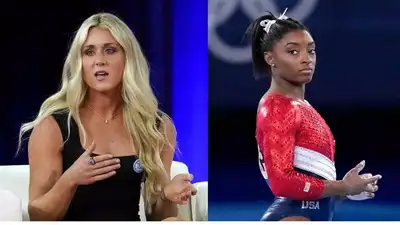ARTICLE AD BOX

The Minnesota State High School Softball Championship became a national flashpoint when Marissa Rothenberger, a transgender girl and star pitcher for Champlin Park High School, led her team to a dominant 6–0 win in the Class 4A title game.
Her standout performance, which included seven shutout innings and two doubles, reignited the national debate surrounding transgender participation in women’s sports.Minnesota's 2015 policy allowing transgender athletes to play in alignment with their gender identity has long been controversial. But Rothenberger’s success in a high-profile championship, just months after a federal executive order sought to ban transgender girls from girls’ and women’s sports, brought the issue to national attention. The victory set off a social media firestorm, culminating in a bitter and highly public feud between former NCAA swimmer Riley Gaines and Olympic gymnast Simone Biles.
Minnesota’s policy: Transgender's participation under fire
Marissa Rothenberger began transitioning at age nine and was cleared to play under the Minnesota State High School League’s guidelines. These rules allow transgender athletes to compete according to their gender identity after undergoing a review process. Her teammates and coaches praised her performance and resilience, but her participation quickly became a focal point for critics of transgender inclusion.
A lawsuit filed in May 2025 by the advocacy group Female Athletes United argues that Rothenberger’s inclusion violates Title IX, which bars sex-based discrimination in federally funded education. Plaintiffs in the case allege that cisgender female athletes lost opportunities due to Rothenberger’s presence, including one who reportedly missed a chance to advance to the state tournament and another who suffered an injury from a fast pitch.
Riley Gaines responds: “When your star player is a boy” you win
Riley Gaines, a former NCAA swimmer who has become one of the most vocal critics of transgender participation in women’s sports, responded swiftly to Champlin Park High School’s state championship win. She framed the outcome as yet another example of biological males dominating girls’ sports, arguing that the inclusion of Marissa Rothenberger compromised the fairness of the competition.
Gaines also took aim at Minnesota Governor Tim Walz for supporting the state’s transgender inclusion policy, accusing him of failing to protect the rights and opportunities of cisgender female athletes.
She further criticized the team for turning off public comments on their championship post, implying it was an attempt to silence backlash over Rothenberger’s gender identity. In a widely circulated comment, Gaines remarked, “Comments off lol.
To be expected when your star player is a boy,” underscoring her stance that allowing transgender athletes in girls’ sports undermines integrity and transparency.
Her activism is deeply rooted in her personal experience at the 2022 NCAA Championships, where she tied with Lia Thomas, a transgender swimmer, for fifth place in the 200-yard freestyle.
While both finished with identical times, Thomas was awarded the fifth-place trophy, a decision Gaines has since cited as symbolic of what she sees as the disadvantages faced by female athletes in the current landscape.
Simone Biles defends inclusivity
Simone Biles responded strongly to Gaines’s remarks, condemning her for using past trauma for political arguments. Biles accused Gaines of being a sore loser and suggested that her campaign against transgender athletes was rooted more in personal resentment than genuine concern.
Biles called for more inclusive solutions, such as developing new categories or structures that could allow transgender athletes to compete fairly and safely.
Biles emphasized that the well-being and mental health of all athletes should be prioritized and argued that inclusivity and fairness do not need to be mutually exclusive. Her stance, shaped by her own experience of abuse and advocacy for athlete protection, emphasized creating safe and respectful environments for everyone in sports.
The Nassar Controversy
The controversy escalated when Gaines drew a comparison between transgender inclusion and the sexual abuse scandal involving former USA Gymnastics doctor Larry Nassar. She referenced Simone Biles’s advocacy for inclusion and contrasted it with Biles’s history as a survivor of Nassar’s abuse. Gaines suggested that Biles’s support for policies allowing transgender women in locker rooms conflicted with her previous efforts to speak out against sexual exploitation in sports.Riley Gaines shared a video of Simone Biles testifying about surviving Larry Nassar's sexual abuse alongside Biles' recent tweet criticizing Gaines, with the text "Simone Biles when she had to endure a predatory man Vs Simone Biles when other girls have to endure predatory men," suggesting inconsistency in Biles' stance on athlete safety regarding transgender inclusion. The post, with over 1 million views, drew mixed reactions, with critics like @NebsGoodTakes calling it "evil" for exploiting Biles' trauma, while supporters like @ValentinaForUSA found Biles' support for transgender inclusion "astonishing" given her Nassar experience.
Gaines clarified her position, hoping Nassar "rots in prison" and arguing both Nassar's abuse and transgender inclusion threaten female athletes, but the post's sensitivity has intensified the debate over fairness and inclusivity in sports.
The reference to Nassar hit a nerve because it reopened wounds from one of the most horrifying abuse scandals in sports history. Larry Nassar, the longtime team doctor for USA Gymnastics and a physician at Michigan State University, sexually abused more than 300 girls and young women under the guise of medical treatment.
Despite multiple reports over decades, institutions failed to act, allowing the abuse to continue unchecked.
The scandal came to light in 2016, and in the years that followed, top athletes like Simone Biles, Aly Raisman, and Jamie Dantzscher gave powerful testimony about how a culture of silence and institutional protection enabled Nassar's crimes. His case exposed how sports organizations had prioritized medals and reputation over athlete safety.
Legal and social ramifications
The ongoing lawsuit in Minnesota could become a pivotal legal case as it challenges the long-standing policy of transgender inclusion at the state level. Female Athletes United is demanding changes that would prohibit transgender girls from participating in girls’ sports and retroactively adjust records where they believe competitive integrity was compromised.On social media, reactions have been highly polarized.
Supporters of Gaines continue to argue that allowing transgender athletes creates an unfair advantage and diminishes opportunities for cisgender girls. Others, like supporters of Biles, stress the need to support transgender youth and argue that inclusion can be achieved while still respecting the integrity of competition.The Minnesota softball championship has become a defining moment in the escalating debate over gender identity and fairness in school sports.
At the core of the controversy is a growing concern among female athletes and advocates like Riley Gaines, who argue that the integrity of girls’ sports is being compromised. For them, allowing biologically male athletes to compete in female categories threatens the level playing field Title IX was meant to protect.
Gaines and others are calling for clear boundaries to ensure that cisgender girls retain equal opportunities, scholarships, and safety in competition. As Marissa Rothenberger’s dominant performance reignites national attention, many believe it is time to prioritize fairness over ideology and protect the spaces originally created for women and girls.



.png)
.png)
.png)
















 1 day ago
3
1 day ago
3









 English (US) ·
English (US) ·